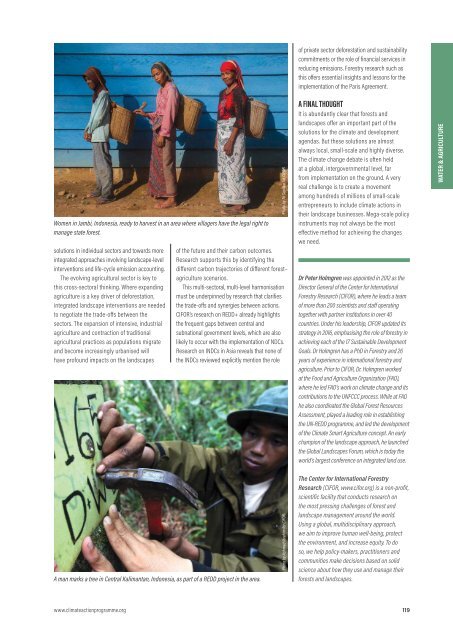Climate Action 2016-2017
You also want an ePaper? Increase the reach of your titles
YUMPU automatically turns print PDFs into web optimized ePapers that Google loves.
Women in Jambi, Indonesia, ready to harvest in an area where villagers have the legal right to<br />
manage state forest.<br />
solutions in individual sectors and towards more<br />
integrated approaches involving landscape-level<br />
interventions and life-cycle emission accounting.<br />
The evolving agricultural sector is key to<br />
this cross-sectoral thinking. Where expanding<br />
agriculture is a key driver of deforestation,<br />
integrated landscape interventions are needed<br />
to negotiate the trade-offs between the<br />
sectors. The expansion of intensive, industrial<br />
agriculture and contraction of traditional<br />
agricultural practices as populations migrate<br />
and become increasingly urbanised will<br />
have profound impacts on the landscapes<br />
Photo by Tri Saputro for CIFOR.<br />
of the future and their carbon outcomes.<br />
Research supports this by identifying the<br />
different carbon trajectories of different forest–<br />
agriculture scenarios.<br />
This multi-sectoral, multi-level harmonisation<br />
must be underpinned by research that clarifies<br />
the trade-offs and synergies between actions.<br />
CIFOR’s research on REDD+ already highlights<br />
the frequent gaps between central and<br />
subnational government levels, which are also<br />
likely to occur with the implementation of NDCs.<br />
Research on INDCs in Asia reveals that none of<br />
the INDCs reviewed explicitly mention the role<br />
of private sector deforestation and sustainability<br />
commitments or the role of financial services in<br />
reducing emissions. Forestry research such as<br />
this offers essential insights and lessons for the<br />
implementation of the Paris Agreement.<br />
A FINAL THOUGHT<br />
It is abundantly clear that forests and<br />
landscapes offer an important part of the<br />
solutions for the climate and development<br />
agendas. But these solutions are almost<br />
always local, small-scale and highly diverse.<br />
The climate change debate is often held<br />
at a global, intergovernmental level, far<br />
from implementation on the ground. A very<br />
real challenge is to create a movement<br />
among hundreds of millions of small-scale<br />
entrepreneurs to include climate actions in<br />
their landscape businesses. Mega-scale policy<br />
instruments may not always be the most<br />
effective method for achieving the changes<br />
we need.<br />
Dr Peter Holmgren was appointed in 2012 as the<br />
Director General of the Center for International<br />
Forestry Research (CIFOR), where he leads a team<br />
of more than 200 scientists and staff operating<br />
together with partner institutions in over 40<br />
countries. Under his leadership, CIFOR updated its<br />
strategy in <strong>2016</strong>, emphasising the role of forestry in<br />
achieving each of the 17 Sustainable Development<br />
Goals. Dr Holmgren has a PhD in Forestry and 26<br />
years of experience in international forestry and<br />
agriculture. Prior to CIFOR, Dr. Holmgren worked<br />
at the Food and Agriculture Organization (FAO),<br />
where he led FAO’s work on climate change and its<br />
contributions to the UNFCCC process. While at FAO<br />
he also coordinated the Global Forest Resources<br />
Assessment, played a leading role in establishing<br />
the UN-REDD programme, and led the development<br />
of the <strong>Climate</strong> Smart Agriculture concept. An early<br />
champion of the landscape approach, he launched<br />
the Global Landscapes Forum, which is today the<br />
world’s largest conference on integrated land use.<br />
WATER & AGRICULTURE<br />
A man marks a tree in Central Kalimantan, Indonesia, as part of a REDD project in the area.<br />
Photo by Achmad Ibrahim for CIFOR.<br />
The Center for International Forestry<br />
Research (CIFOR, www.cifor.org) is a non-profit,<br />
scientific facility that conducts research on<br />
the most pressing challenges of forest and<br />
landscape management around the world.<br />
Using a global, multidisciplinary approach,<br />
we aim to improve human well-being, protect<br />
the environment, and increase equity. To do<br />
so, we help policy-makers, practitioners and<br />
communities make decisions based on solid<br />
science about how they use and manage their<br />
forests and landscapes.<br />
www.climateactionprogramme.org 119












